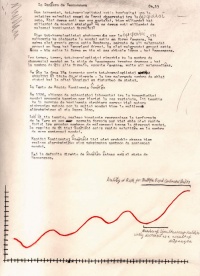Codex-6Bp1-English
From LostRing
(Difference between revisions)
| Revision as of 11:04, 5 April 2008 (edit) Limako (Talk | contribs) (first paragraph) ← Previous diff |
Revision as of 11:11, 5 April 2008 (edit) (undo) Limako (Talk | contribs) (another few paragraphs) Next diff → |
||
| Line 9: | Line 9: | ||
| :The Danger of Neopangaea | :The Danger of Neopangaea | ||
| :<br> | :<br> | ||
| - | :For centuries, whole-cosmologists were confused by the relatively few kinds of earths observed through the Omphalos network. Why should there be only 6 types among billions and billions of worlds? Why should there not be billions and billions of different continental formations? | + | :For centuries, whole-cosmologists were confused by the relatively few kinds of earths observed through the Omphalos network. |
| + | :<br> | ||
| + | :Why should there be only 6 types among billions and billions of worlds? Why should there not be billions and billions of different continental formations? | ||
| + | :<br> | ||
| + | :When whole-cosmologists made extended observations through the Omphalos, they discovered that the majority of the worlds were in the form of Pangaea. The second largest group were Gondwana, followed by smaller groups in Nuna and Kenorland forms. The smallest groups were Gaea -- which is the form in which we six current live -- and Neopangaea. | ||
| + | :<br> | ||
| + | :Through time, however, whole-cosmologists noticed that the number of observed worlds in the state of Neopangaea was growing dramatically -- and the number of all other forms, except Pangaea, was much reduced. | ||
| }}<br clear="all"> | }}<br clear="all"> | ||
Revision as of 11:11, 5 April 2008
English
- Chapter 13: The danger of Neo-Pangaea (1/2)
- The Danger of Neopangaea
- For centuries, whole-cosmologists were confused by the relatively few kinds of earths observed through the Omphalos network.
- Why should there be only 6 types among billions and billions of worlds? Why should there not be billions and billions of different continental formations?
- When whole-cosmologists made extended observations through the Omphalos, they discovered that the majority of the worlds were in the form of Pangaea. The second largest group were Gondwana, followed by smaller groups in Nuna and Kenorland forms. The smallest groups were Gaea -- which is the form in which we six current live -- and Neopangaea.
- Through time, however, whole-cosmologists noticed that the number of observed worlds in the state of Neopangaea was growing dramatically -- and the number of all other forms, except Pangaea, was much reduced.

























